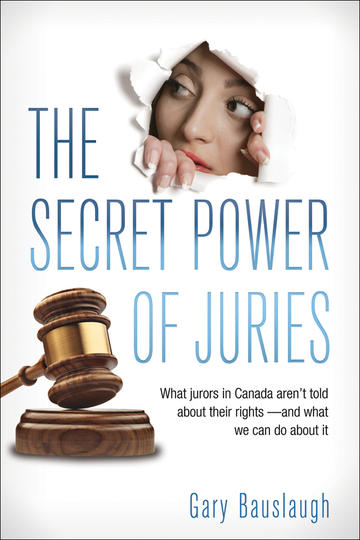Canadians know that the jurors at a trial decide the defendant's guilt or innocence according to the law of the land. What they don't know is how far that right actually goes, and what the real power of juries is.
Sometimes people -- even jurors -- wonder if a law or a judgment in a particular case is a just one. When the law seems wrong, we are told there is only one solution: change the law.
In fact, though, in our legal system there is another remedy: When jurors decide that to question the fairness of applying the law in the case they are deciding may lead to a manifestly unfair and unjust result, they have the right not to apply that law. However, in Canada it is illegal and completely forbidden for a trial lawyer, or even a judge to tell jurors they have this right to nullify the law.
In the Canadian justice system, jurors can hand down a verdict of not guilty even if the facts pointing to guilt are clear, even if the accused doesn't deny the facts, even if the judge tells the jurors to find the accused guilty. This centuries-old safeguard, which goes along with the principle of jury independence, has protected people's rights and freedoms and helped sweep away laws that ordinary citizens think are outdated and unjust.
This power of juries is known to the legal community -- but is largely unknown by the general public -- until now. Gary Bauslaugh, author of Robert Latimer, A Story of Justice and Mercy (Lorimer, 2010), learned the specifics of this matter as a result of his research around the Robert Latimer case. In his new book, written for non-expert readers and citizens who have been summoned for jury duty, he tells the story of jury nullification from Quaker leader William Penn to the modern-day acquittal of Henry Morgentaler, who was charged with conducting abortions. Bauslaugh then lays out the arguments that some people make against jury independence and nullification, and makes his own argument in favour of these safeguards. He offers suggestions for jurors who may find themselves in a situation where their consciences are at odds with the law.
GARY BAUSLAUGH is the author of Robert Latimer, A Story of Justice and Mercy and his writing has appeared in many publications. He has been president of the Humanist Association of Canada and editor of Humanist Perspectives. Gary, who holds a PhD in chemistry from McGill University, was a teacher and administrator in Canadian colleges and universities for many years. He lives in Victoria, BC.
"As it stands, most juries enjoy the power to nullify the law, but not the right to be informed of that power. How can such a stark and seemingly unsustainable paradox exist with respect to jury independence, a core principle of our criminal justice system? Gary Bauslaugh courageously exposes the not-so-open secret of jury nullification, reminding us of a deep legal tradition we are slowly forgetting. With an honest analysis of the real risks involved, he thoughtfully argues that justice, being higher than law, requires the preservation of jury independence, which at its best injects into an imperfect and often inflexible human-devised legal system qualities of mercy and conscience, and, when absolutely necessary, offers a last check on unjust laws. Whether one ultimately agrees or not, this book deserves praise for raising critical questions many seem to want kept permanently secret, even though we may all have a stake in how or whether these issues are resolved."
"For those interested in the power of the jury, this book is a thought-provoking analysis of a troubling question."
"Gary Bauslaughs investigation of jury nullification sheds a fascinating new light on the trial of the convicted mercy killer who could have been spared incarceration if his jury had been fully informed of their right to act above the prescribed law."
"A copy of this book should be in every room where prospective jurors are called for jury duty."
"Gary Bauslaugh brings an important and troubling legal issue to the people of Canada so they can judge how well (or how poorly) the jury system copes with injustice. Written with clarity, and truly engaging the reader."



